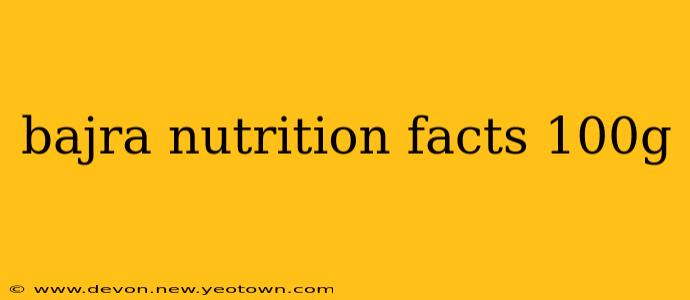Unlocking the Nutritional Powerhouse: Bajra (Pearl Millet) Nutrition Facts and Benefits
Bajra, also known as pearl millet, is a humble grain with an impressive nutritional profile. Often overlooked in the Western world, this ancient grain has been a staple food in many parts of Africa and Asia for centuries. Its resilient nature and ability to thrive in arid conditions have made it a crucial source of sustenance for millions. But beyond its adaptability, bajra boasts a remarkable nutritional composition that deserves a closer look. Let's delve into the detailed nutrition facts of 100g of bajra and explore why it's gaining popularity as a superfood.
Bajra Nutrition Facts (per 100g): A Closer Look
The nutritional content of bajra can vary slightly depending on factors like growing conditions and processing methods. However, a general overview of the nutritional powerhouse that is 100g of bajra includes:
- Calories: Approximately 365-375 kcal
- Carbohydrates: Around 70-75g, with a significant portion being complex carbohydrates. These provide sustained energy release, avoiding the blood sugar spikes associated with refined carbohydrates.
- Protein: Around 10-12g. Bajra offers a good source of plant-based protein, essential for building and repairing tissues.
- Fiber: A substantial 8-10g. This high fiber content contributes to digestive health, promoting regularity and preventing constipation.
- Fat: Approximately 4-5g, mostly unsaturated fats which are beneficial for heart health.
- Minerals: Bajra is rich in essential minerals, including iron, magnesium, phosphorus, and potassium. These minerals play vital roles in various bodily functions, from energy production to maintaining healthy blood pressure.
- Vitamins: It contains various B vitamins, including niacin, thiamine, and riboflavin, which are crucial for energy metabolism and nerve function.
What are the health benefits of bajra?
Bajra’s nutritional richness translates into a multitude of health benefits:
-
Improved Blood Sugar Control: The high fiber and complex carbohydrate content in bajra help regulate blood sugar levels, making it a suitable choice for individuals with diabetes or those aiming to prevent it. The slow release of energy prevents sudden spikes and crashes in blood sugar.
-
Enhanced Digestive Health: The substantial fiber content in bajra promotes healthy digestion, prevents constipation, and supports a healthy gut microbiome. This is crucial for overall well-being, as the gut plays a significant role in immunity and nutrient absorption.
-
Boosted Energy Levels: Bajra provides sustained energy release, perfect for maintaining active lifestyles without the energy crashes associated with refined carbohydrates. The complex carbohydrates and B vitamins work synergistically to support energy production.
-
Strengthened Immunity: The presence of various vitamins and minerals, including zinc and vitamin B6, contributes to a robust immune system. A healthy immune system is essential for warding off infections and maintaining overall health.
-
Heart Health Support: The high fiber and low saturated fat content contribute to maintaining healthy cholesterol levels and reducing the risk of heart disease. The potassium content also helps regulate blood pressure.
Is bajra gluten-free?
Yes, bajra is naturally gluten-free, making it a suitable choice for individuals with celiac disease or gluten sensitivity. This grain offers a nutritious alternative to wheat-based products for those avoiding gluten.
How can I include bajra in my diet?
Bajra is incredibly versatile and can be incorporated into various dishes. It can be consumed as a porridge (like polenta), made into flatbreads (like rotis), used in various stews and soups, or even popped like popcorn! Experiment with different recipes and discover its delightful taste and texture.
What are the potential downsides of eating bajra?
While bajra offers numerous health benefits, it's important to note that consuming excessive amounts may lead to digestive discomfort due to its high fiber content. It's best to gradually increase bajra intake to allow your body to adjust. Also, those with certain digestive conditions should consult a healthcare professional before making significant dietary changes.
This exploration of bajra's nutritional profile underscores its value as a nutritional powerhouse. It's a grain deserving of a prominent place in a balanced and healthy diet. Remember to consult with a healthcare professional or registered dietitian for personalized dietary advice.

